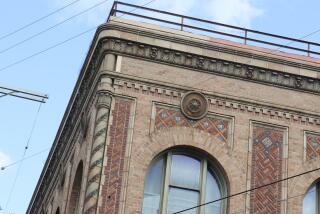Church of Open Door Sold, Will Be Demolished
- Share via
The landmark Church of the Open Door, known for its red neon “Jesus Saves” sign, has been sold and will be demolished by developers who plan to build a 27-story office tower on the site, the Los Angeles Business Journal reports.
In today’s edition, the Journal said an entity known as the Ninth and Grand Partnership will pay $20 million in cash for the 73-year-old Italian Renaissance building and then resell the property to an unidentified East Coast developer for $34 million.
The unnamed developer and the Ninth and Grand Group will then embark on a joint venture to build the office tower, the Journal said.
The Glendora-based Church of the Open Door had sold the building in 1986 to television evangelist Gene Scott, but repossessed the building in March in a foreclosure sale brought on by Scott’s failure to meet payments on the $23-million purchase.
During a protracted legal battle with the church, Scott succeeded in obtaining approval in July from the City Council to declare the church a historical landmark--a move that delayed the property’s demolition, sale or renovation. The City Council is scheduled to decide in February whether to extend a prohibition on demolition.
After the Oct. 1 earthquake, however, the city ordered the building vacated because of structural damage.
A representative of the Ninth and Grand Partnership told the Journal it would cost more than $15 million to make the building earthquake-safe.
The Church of the Open Door has sought to sell the property to help finance a new headquarters in Glendora, the Journal said.
The developers of the property, in exchange for the right to construct a taller building than would be allowed under current zoning laws, will be expected to contribute several million dollars to the reconstruction of the Central Library, the Journal said.
The Ninth and Grand General Partnership entered into a non-extensible 90-day escrow Oct. 6, putting down a non-refundable $500,000 deposit, the Journal said.
More to Read
Sign up for Essential California
The most important California stories and recommendations in your inbox every morning.
You may occasionally receive promotional content from the Los Angeles Times.













